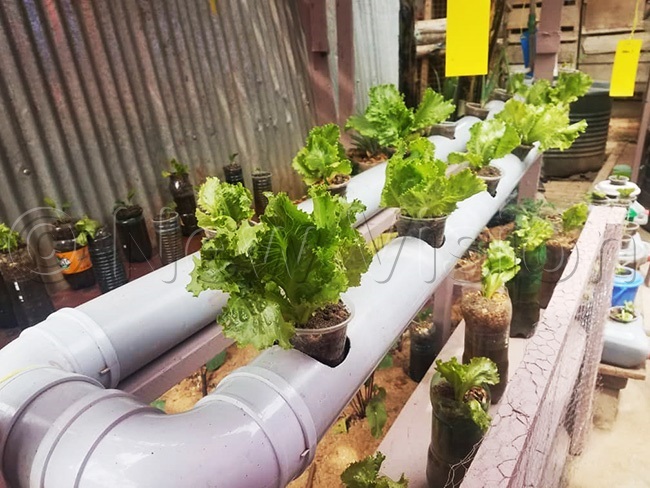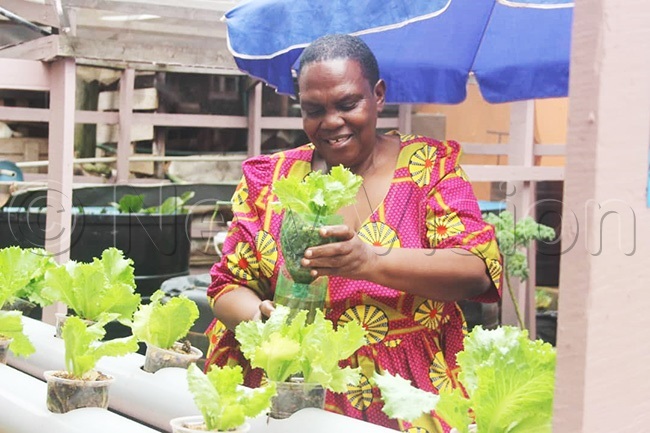Youth told to use lockdown to acquire skill in agriculture
AGRIBUSINESS |
It is over 100 days since schools were closed and students locked home as one of the restrictive measures to prevent the spread of coronavirus in Uganda.
Although some restrictions are being relaxed it is not clear when schools will be opened for learning to resume normally.
This is one of the longest period children have spent home without learning and with a lot of uncertainty over the future. Many young people are feared to drop out of school due to this lockdown.
Dr Jolly Kabirizi, one of Uganda's best farmers, says the youth need to be involved in the agriculture sector to gain skills that can help them transform their lives.

"This lockdown period is a great opportunity for youth to acquire skills in agriculture. There are many opportunities for young people to make money in agriculture which should be explored," Kabirizi says.
Kabirizi, who is the owner of Kyakuwa farm, which she says is a model farm for peri-urban farmers made the comments during a Zoom meeting, to discuss MY HOME PROJECT-Youth Engagement Series, organized by Ronald Ddungu, an education advisor at VVOB-education for development.
The virtual meeting, where the youth had live presentations about their farms was attended largely by several youths offering agriculture as a subject and their teachers.
"We are available to guide them and help them acquire the skills. Though I usually charge between sh30,000 and 50,000 for adults who come to learn, the young people can come and learn for free," Kabirizi says.
With growing youth unemployment, aging farmers, and declining crop yields under traditional farming systems, engaging youth in agriculture should be a priority.
"COVID-19 should be a lesson to everybody. Let us try to work and agriculture is providing us with opportunities to make money. You can start raising seedlings for people around you. There are very many people looking for seedlings. It is not expensive to establish a nursery bed," Kabirizi says.
She says the youth can establish small poultry, grow mushrooms or engage in hydroponic farming using simple technology.
"We are not going to keep waiting for money from parents. There are many farming activities you can engage in instead of loitering around. You will earn money and skills which will help you grow bigger," Kabirizi says.
She notes that the youth can work with local farmers or establish enterprise in groups for those who can't do it individually.
She challenged agriculture teachers to be role models and practice what they teach for learners to pick a leaf.

"Teachers should be role models; you are teaching agriculture but you have no garden. You should walk the talk as a teacher," Kabirizi says.
Joshua Kisubika, a guest speaker from Kyakuwa farm encouraged the youth to embrace Hydroponic farming to earn money.
"There is a lot of money in agriculture. For those who don't want to get dirty there are many ways of doing agriculture without getting dirty like us in hydroponic farming," Kisubika says.
Hydroponic farming is a method of growing plants using mineral nutrient solutions, in water, without soil.
At Kyakuwa farm, the technology is being applied to grow vegetables and fodder for the animals.
"All you need are; sawdust, fertilizers, and water. If you are just starting and don't have a lot of resources you can use empty plastic bottles or jerricans like I'm doing," Kisubika says.
The major advantage with such a system is the absence of weeds and other soil-borne pests, no toxic pesticide residue, better use of water, better control over nutrient and oxygen, increased crop quality and yields.
The technology ensures a reduction or exclusion of pesticides and herbicides because the plants are in a protected environment.
Ddungu believes that it is possible to link the youth to inspirational farmers like Dr. Kabirizi through the available online platforms such as Zoom, Teams so that the youth are mentored and skilled in various agricultural practices.
"This would encourage the youth to start up their Home projects that support food security at the household level and income generation for the youth," Ddungu says.
According to Bonny Bukenya, an agriculture teacher, at Bombo Army Secondary School, the lockdown has helped teachers know what students are doing in these forced holidays.
"Despite the lockdown which has affected the learning, we are happy that technology has enabled us to see what young people are doing in the lockdown in the field of agriculture," Bukenya says.
He reveals that if it was not for COVID-19 lockdown teachers would not have had an opportunity to follow up on what the young people are doing in homes.